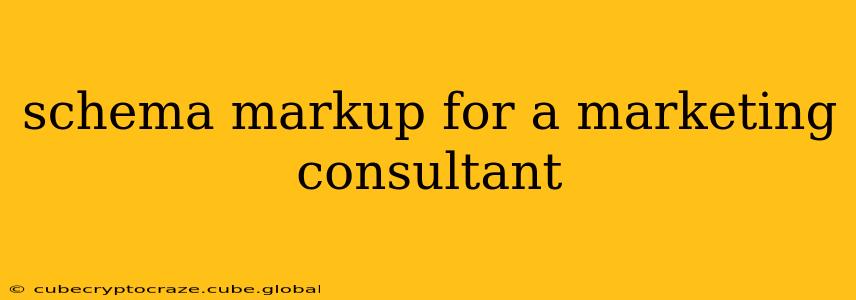Schema Markup for a Marketing Consultant: A Comprehensive Guide
Schema markup is crucial for improving your online visibility and helping search engines understand your business. For a marketing consultant, using the correct schema can significantly boost your search engine rankings and attract more clients. This guide will walk you through creating effective schema markup for your marketing consultant website.
What is Schema Markup?
Schema markup is a type of code that you add to your website's HTML. It uses a vocabulary called schema.org to provide structured data about your business, services, and content to search engines. This structured data helps search engines understand the context of your website more accurately, leading to richer snippets in search results (like star ratings or detailed descriptions) and potentially higher rankings.
Key Schema Types for Marketing Consultants:
Several schema types can be beneficial for marketing consultants. The most relevant are:
-
LocalBusiness: If you have a physical office, this schema type is essential. It allows you to provide information like your address, phone number, opening hours, and even photos. This is crucial for local SEO.
-
Service: This schema is vital for outlining the specific services you offer. You can create individual
Serviceschemas for each service, such as SEO consulting, social media marketing, content marketing, PPC advertising, etc. EachServiceschema can contain details about the service, its cost (if applicable), and its benefits. -
Person: As a marketing consultant, your expertise and credibility are paramount. Using the
Personschema allows you to provide details about your background, experience, and qualifications. This helps build trust and authority. -
Organization: This schema helps provide details about your company's name, address, contact information, and potentially logos or social media links.
How to Implement Schema Markup:
There are several ways to implement schema markup:
-
JSON-LD: This is the recommended method. JSON-LD is placed within the
<head>section of your website's HTML. It's easy to read and implement. -
Microdata: This method uses HTML attributes to embed structured data directly into your website's content.
-
RDFa: This is a more complex method that uses HTML attributes to embed structured data. It's less commonly used than JSON-LD.
Example JSON-LD for a Marketing Consultant:
Here's an example of JSON-LD schema markup for a marketing consultant. Remember to replace the bracketed information with your own details:
{
"@context": "https://schema.org/",
"@type": "LocalBusiness",
"name": "[Your Business Name]",
"url": "[Your Website URL]",
"telephone": "[Your Phone Number]",
"address": {
"@type": "PostalAddress",
"streetAddress": "[Your Street Address]",
"addressLocality": "[Your City]",
"addressRegion": "[Your State]",
"postalCode": "[Your Zip Code]",
"addressCountry": "[Your Country]"
},
"openingHours": "[Your Opening Hours]",
"image": "[URL of your business logo]",
"sameAs": [
"[Your Facebook URL]",
"[Your LinkedIn URL]",
"[Your Twitter URL]"
],
"areaServed": "[Your Service Area]",
"priceRange": "[Your Price Range - e.g., $$]",
"offers": {
"@type": "Offer",
"price": "[Price]",
"priceCurrency": "USD"
},
"hasOfferCatalog": {
"@type": "OfferCatalog",
"itemListElement": [
{
"@type": "Offer",
"name": "SEO Consulting",
"url": "[URL to SEO Consulting page]",
"price": "[Price]",
"priceCurrency": "USD"
},
{
"@type": "Offer",
"name": "Social Media Marketing",
"url": "[URL to Social Media Marketing page]",
"price": "[Price]",
"priceCurrency": "USD"
}
//Add more services as needed.
]
}
}
Testing Your Schema Markup:
After implementing your schema markup, use Google's Rich Results Test tool to verify that your code is correct and will be properly interpreted by search engines.
People Also Ask (PAA) questions and answers:
-
What is the difference between schema markup for LocalBusiness and Organization?
LocalBusinessis specifically for businesses with a physical location, emphasizing local SEO.Organizationis more general and can be used for businesses with or without a physical location. For a marketing consultant, you might use both;LocalBusinessif you have an office andOrganizationfor broader brand information. -
Do I need to use all schema types? No, you can use the schema types most relevant to your business. Prioritize
LocalBusiness(if applicable),Service, andPersonfor maximum impact. -
How often should I update my schema markup? Update your schema whenever your business information changes (address, phone number, services offered, etc.).
-
Where do I put the schema markup on my website? Ideally, place your JSON-LD schema within the
<head>section of your HTML.
By implementing the appropriate schema markup and regularly reviewing and updating it, you'll significantly improve your website's visibility in search engine results, leading to increased organic traffic and, ultimately, more clients. Remember to tailor the schema to accurately reflect your services and expertise.
